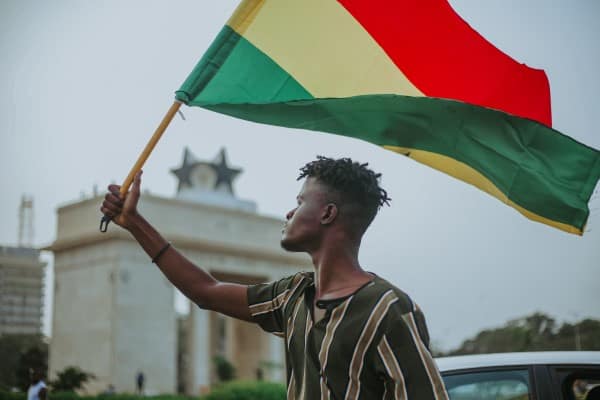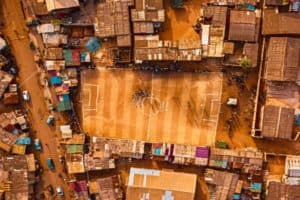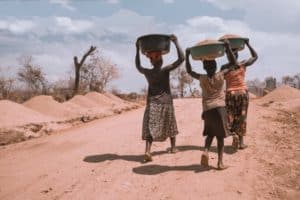This page contains affiliate links. This means if you a follow a link and make a purchase, at no additional cost to you, Humanitarian Careers will receive a commission. Thank you for supporting the site.
Human rights establish a set of principles by which all people should be treated. They provide a framework of protection for people regardless of their age, gender, race, sexual orientation, ethnicity or religious belief. In Africa, human rights are enshrined in UN treaties, national laws and African Union resolutions. Although legally many Africans have their rights protected, in fact there are significant challenges across the continent in terms of human rights.
We’ve drawn-up a list of the most pressing human rights issues across Africa and given examples of countries where human rights challenges must be addressed…
Ethnic Discrimination
One of biggest human rights challenges in Africa is ethnic discrimination. The UN Declaration on Race and Racial Prejudice adopted in 1978 states that all people should be free from discrimination based on race. However, many reports rate African countries among the worst in terms of human rights for ethnic minorities.
Ethnic discrimination is denying someone their rights based on their ethnicity, culture or heritage. Most African nations contain multiple ethnic groups. A legacy of European colonialism is that many African countries have majority and minority ethnic groups. This has led to competition and conflicts over power and resources. It has resulted in widespread ethnic discrimination which poses a major human rights challenge in Africa.
Perhaps the most famous example of human rights violations in Africa due to ethnic discrimination was apartheid South Africa. The legacy of white minority rule in South Africa has still left a legacy of ethnic discrimination and human rights challenges.
The current conflict in Ethiopia’s Tigray region is a more contemporary example of human rights issues and ethnic discrimination in Africa.
Lack of Fair Trials and Legal Due Process
Another major human rights challenge in Africa is the lack of fair trials and legal due process. The 1992 resolution by the African Commission on Human and Peoples’ Rights ‘recognised that the right to a fair trial is essential for the protection of fundamental human rights and freedoms’
Almost all countries in Africa have issues with fair trials and legal due process. Many African countries lack accountable legal systems. This means people are often unfairly treated, denied a legal trial, held without due process or are unable to access their legal rights. Creating fair and transparent legal systems in many African countries is one of the most urgent human rights challenges.
An example of a country facing human rights challenges in relation to fair trails and legal systems is Egypt. There are reports of illegal detention, denials of due legal process and irregularities in the treatment of detainees.
Kenya is another example of an African country facing challenges in the fairness of its legal system.
Limits on Freedom of speech
Many African countries rank poorly for freedom of speech. Article 19 of the Universal Declaration of Human Rights, adopted by the UN in 1948, enshrines the right freedom to speech and to publish without fear or harassment or detention. Across the Africa, freedom of speech is a significant human rights challenge.
All human beings have the right to speak freely. This includes in private and public settings, as well as online and in print. However, exercising this right is a major issue for many Africans. Repressive states and authoritarian regimes often limit freedom of speech as they see it as a challenge to their authority. There are many such regimes across Africa resulting in the right to freedom of speech often being denied.
Yoweri Museveni has been the authoritarian ruler of Uganda since 1986. Uganda often ranks poorly on freedom of speech indexes. The right to speak, print and write online freely is a major challenge in Uganda.
Another example of an African country where the right to freedom of speech is a major challenge is Egypt – cases of detention and torture as a result of self-expression have been reported as being on the rise.
Religious Persecution
A major human rights challenge in many African countries is religious discrimination. The freedom to practice religious beliefs is enshrined in Universal Declaration of Human Rights and the International Covenant on Civil and Political Rights.
Africa has a rich history of religious practice with a mixture of traditional African religions as well as large Christian and Muslim populations. However, religious freedom as a human right is a major challenge in many parts of Africa. Discrimination in work, housing, access to services and freedom to practice a person’s religion are all issues. In some parts of Africa people face persecution and even harm or death due to their religious faith.
The Central African Republic (CAR) has seen an on-going civil conflict along religious lines since 2012. There have been widespread reports of atrocities committed against people due to their religion. CAR is just one example of religious discrimination as a human rights issue in Africa.
Restrictions on Freedom of Assembly
Freedom of assembly is the human right that allows all people to gather with, when and where they wish without undue restrictions. It also enshrines the freedom to associate with any group of a person’s choosing.
The right to freedom of assembly and freedom of association is a significant challenge in many parts of Africa. Many African governments deny their citizens the right to protest; especially on issues they feel affect their authority or security. This level of control denies many Africans their fundamental human right to gather and associate freely. Many African countries also limit associations, such political parties and trade unions, further denying the human rights of their citizens.
Many people praise the regime in Rwanda for developing the country following the 1994 genocide. However, the regime in Rwanda is highly repressive and can be used an example of an African country where the right to freedom of assembly and association is a major human rights challenge.
The current military coup and clamp down on protestors in Sudan is another example of the issue of freedom to protest in Africa.
Use of Child Labour
Another significant human rights challenge in Africa is the use of child labor. The 1989 UN Convention on the Rights of the Child prohibits the use of children in the workforce.
Currently there are estimated to be 72.1 million children in Africa who are working. This means they’re not gaining an education. It also means they are more at risk of exploitation, harm and abuse. Many children in Africa also work in dangerous and harmful conditions. Removing children from the workforce and ensuring all children can access schooling is one of the biggest human rights issues in Africa.
An example of an African country where child labor is a major human rights issue is the Democratic Republic of Congo (DRC). Children are often found working in mineral mines in the DRC and reports have highlighted the dire working conditions.
A recent Maplecroft report highlighted Eritrea and Somalia as the worst countries in the world for child labour. This shows the extent of the problem in Africa.
Lack of Privacy Protection
Privacy is a fundamental human right enshrined in Article 12 of the Universal Declaration of Human Rights.. The right to privacy means all people have the right to private space as well as the right to store information and data confidentially – this includes from other individuals, businesses and the government.
Allowing people to exercise their right to privacy is a wide-ranging human rights challenge in Africa. The continent has many repressive states, with 14 out of 54 African nations categorized as ‘dictatorships’. These repressive regimes regularly violate their citizen’s right to privacy. Alongside this, consumer protection and data laws are general weak across Africa, meaning personal information is often loss, stolen or shared without consent.
There are many examples of privacy being human rights challenge in Africa. Two countries that have been highlighted as lacking the right to privacy are Kenya and Nigeria – where governments have been accused of accessing citizen’s private data under the guise of security.
In order for human rights to protected in Africa, the challenge of people’s right to privacy must be addressed.
Unlawful Detainment
States have the right to detain citizens, either because they have committed a crime, or for the protection of the public or themselves. However, the state must have grounds to detain someone. Unlawful detainment is when people are held without grounds or under false pretences.
Unlawful detainment is a major human rights problem in Africa. There are many African countries where people are held or imprisoned without proper reason. These include instances of the detainment of anti-government activists, protestors, civil liberty campaigners and members of human rights groups. Unlawful detainment also covers people being held without access to their legal rights – another major human rights issue in many African countries.
There are many examples of unlawful detainment being a human rights challenge in Africa. There have been recent reports of people being held unlawfully in Cameroon as part of the clamp down by the state on secessionist rebels in the Anglophone region. There have also been high-profile cases of unlawful detainment in South Sudan, including of children.
Lack of Education
The UN Convention on the Rights of the Child enshrines education as a human right. Currently, there are 30 million children in Africa who do not go to school. Children being able to access education is a serious human rights challenge across the continent.
All children need to go to school. Education provides children with the understanding and knowledge needed to progress in life. It also gives them the opportunity to enter the workforce with the skills needed to prosper. However, many African countries fail to provide sufficient quality schooling to their young people. This denies them their right to education and results in many children being unable to reach their potential.
Liberia is an example of a lack of education being a major human rights challenge in Africa. Liberia is the country in the world with the highest rate of children out of school – at nearly two thirds. Liberia is also ranked among the poorest countries in the world, highlighting how denying children’s right to an education holds back many African countries.
Use of Torture
Torture is a major human rights violation. The use of both physical and psychological torture is banned by Article 5 of the Universal Declaration of Human Rights.
There are widespread reports of the use of torture in many African countries. Both government forces and rebel groups in many countries on the continent have been accused of torturing people. Ending the use of torture is a major human rights challenge in Africa. Torture not only physically and mentally scars people, but also has been proven to produce limited results in terms of reducing crimes or getting information.
Often the use of torture in Africa is not sanctioned by the state. In fact many African countries have laws explicitly banning it. However, there are widespread reports, such as from Kenya and Nigeria, where government forces have used torture despite the legal ban.
Ending the use of all forms of torture in Africa is one of the biggest human rights challenges. Significant progress needs to be made in many African countries to fully implement bans on the use of torture.
Human Rights Online Courses
One of the biggest challenges faces Africa is climate change. Global heating will have a dramatic affect on the continent. The online short course Climate Change and Human Rights looks at how these two areas intersect. It is a fascinating course for anyone interested in human rights in Africa. Click the link to begin enrolling.
For those that want an introduction to human rights, we recommend the online course Human Rights: A Basic Course. This provides students with an overview of the history of human rights, as well as looks the modern challenges human rights face. The link is to the course’s page.
If you are interested in human rights in a broader context, we highly recommend the online short course Human Rights for Open Societies offered by Utrecht University in the Netherlands. This course looks at how human rights legislation can become undermined and the importance of protecting human rights conventions from attack. Follow the link for more information.
Discrimination Against Homosexuals
Discrimination against homosexuals is a major human rights challenge in Africa. The right not to be discriminated against on the basis of a person’s sexuality is enshrined in the Universal Declaration of Human Rights.
The state of human rights and protection for homosexual people across Africa is dire. 28 African states have laws against homosexuality – many punishing it with imprisonment. Mauritania and parts of Nigeria have death penalty laws for homosexuality. As well as legal barriers, many African states do little to discourage persecution and discrimination against homosexuals including harassment, abuse and the denial of work, housing, education and healthcare.
Addressing the treatment of homosexual people in Africa is one of the biggest human rights challenges. Changes in laws, as well as people’s perceptions, must be made if homosexual people in many parts of the continent are going to have their rights protected.
Refusing Right To Asylum
The right to seek asylum is a basic human right enshrined in the Universal Declaration of Human Rights and the 1951 Convention relating to the Status of Refugees: Non-penalization, Detention and Protection. Millions of people each year are forced to flee their homes due to conflict or persecution. All countries are legally obligated to take refugees.
There are currently more than 18 million refugees in Africa. Major conflicts, including in South Sudan, Somalia, Ethiopia and Central African Republic have made huge numbers of people displaced. Smaller conflicts, as well as persecution based on religion, sexuality or political beliefs, also drives hundreds of thousands of refugees on the continent. However, accessing the right to refugee status can be a major issue in some African countries.
An example of the challenge African refugees can face accessing their rights is South Africa. Although the country has comparatively progressive refugee laws, in fact reports suggest many refugees in South Africa are denied their rights.
Another example of human rights challenges and the mistreatment of refugees in Africa is in Libya, where people attempting to use the country to transit to Europe face unlawful detention, torture, forced labour and abuse.
Disallowing Property Rights
The right to own private property is enshrined in the Universal Declaration of Human Rights. However, many African countries face challenges with implementing property rights and protecting private ownership.
Being able to own property is a foundational human right. Land ownership is especially important in in many poorer African countries as people and communities who cannot prove ownership of the land they live on and farm can be easily removed by either people who wish to acquire the land or private companies.
Ensuring that property ownership is respected as a human right is a major issue in Africa. African governments have also been recorded as confiscating private property or claiming private land without compensation – further highlighting property ownership as a major human rights issue on the continent.
Many issues with property ownership in African counties are due to limited records of land ownership, such as in Mozambique and Zambia. These issues must be resolved if human right are to improve in Africa.
Discrimination Against Women
Women and girls face significant discrimination in many parts of Africa and this is a major human rights challenge. The right not to face prejudice because of your gender is enshrined in the Protocol to the African Charter on Human and Peoples’ Rights on the Rights of Women in Africa, also known as the Maputo Protocol.
In many African countries, women and girls face a range of issues that restrict their human rights. This can include gender-based violence, forced marriages, child marriages, female genital mutilation, denial of property ownership, denial of the right to work and restrictions on the access to quality healthcare.
Some African counties have been voted the worst in the world to be a woman. This highlights the major challenges women face in parts of Africa in relation to human rights. South Sudan, Chad, the Central African Republic and the Democratic Republic of Congo all perform badly for indicators related to the rights and treatment of women and girls.
The issues around the rights of women and girls is significant in many parts of Africa and extensive work must be undertaken if human rights on the continent are to improve.




